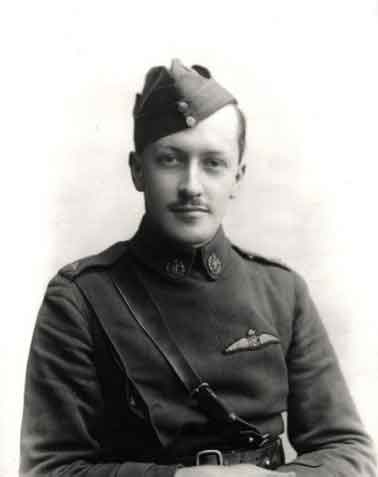William Rhodes-Moorhouse was an aviation pioneer and a First World War hero. In his short military career, he became the first airman ever to be awarded a Victoria Cross.
William Rhodes-Moorhouse’s parents came from New Zealand, but the family lived in Northamptonshire for twenty years. William was baptised in Lamport Church and the family lived at Lamport Hall and later at Spratton Grange. When he grew up he loved motorcycles and cars – especially sports cars like the Austro Daimler and the Hispano Suiza. Newspapers often recorded his daredevil activities on the road.
William was an aviation pioneer in the early 20th century. With his business partner James Radley, he built and raced a flying machine. William caused a sensation in 1911 when he landed his Radley-Moorhouse monoplane on the Racecourse in Northampton. Most people had never seen a flying machine before and journalists described the thrill of seeing a man in a machine flying like a bird. In 1912, William became the first person to fly across the English Channel with two passengers.
William was a friend of the well-known Mobbs brothers from Northampton. He played billiards at the Northampton and County Club with rugby player and war hero Edgar Mobbs.
 William joined the Royal Flying Corps as soon as the First World War started in August 1914. He was posted to Merville in northern France in March 1915 and flew BE2 biplanes on scouting missions over the German lines. On 26th April 1915, he was ordered to fly to Courtrai in Belgium to bomb the railway line that brought up enemy troops and supplies of chlorine gas. BE2 biplanes were intended to carry cameras, not bombs, so a special bomb carriage had to be added to his plane. Three Royal Flying Corps planes flew off that afternoon to destroy the railway line, but William was the only pilot who succeeded. However, he was badly wounded by enemy fire. For the thirty minute return flight, he bled profusely as he flew low over the trenches with a badly damaged aircraft. Almost unconscious, he somehow landed safely and insisted on reporting to his commanding officer before being treated. He died of his wounds the next day. The ground staff counted ninety-five holes in his machine.
William joined the Royal Flying Corps as soon as the First World War started in August 1914. He was posted to Merville in northern France in March 1915 and flew BE2 biplanes on scouting missions over the German lines. On 26th April 1915, he was ordered to fly to Courtrai in Belgium to bomb the railway line that brought up enemy troops and supplies of chlorine gas. BE2 biplanes were intended to carry cameras, not bombs, so a special bomb carriage had to be added to his plane. Three Royal Flying Corps planes flew off that afternoon to destroy the railway line, but William was the only pilot who succeeded. However, he was badly wounded by enemy fire. For the thirty minute return flight, he bled profusely as he flew low over the trenches with a badly damaged aircraft. Almost unconscious, he somehow landed safely and insisted on reporting to his commanding officer before being treated. He died of his wounds the next day. The ground staff counted ninety-five holes in his machine.
William was posthumously promoted to Lieutenant and awarded the Victoria Cross. He was the first airman ever to be awarded the medal.